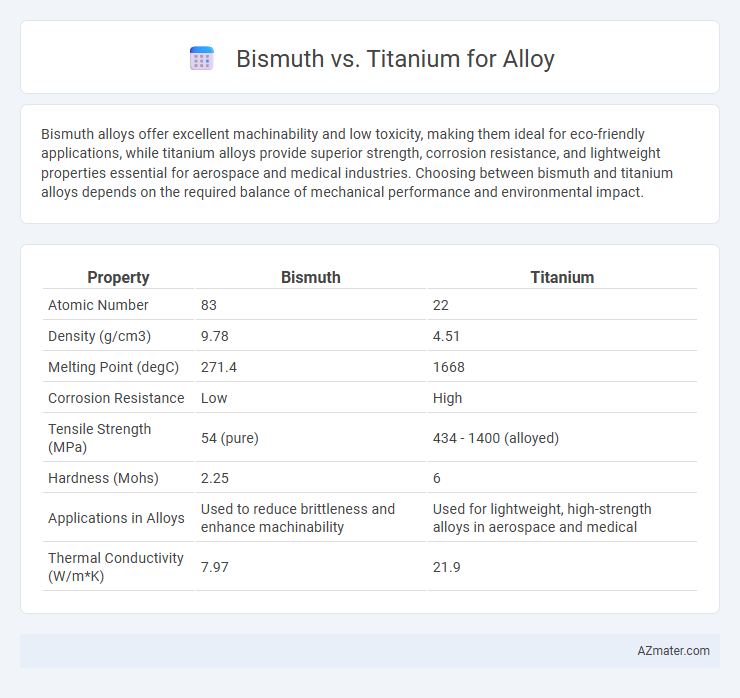Bismuth alloys offer excellent machinability and low toxicity, making them ideal for eco-friendly applications, while titanium alloys provide superior strength, corrosion resistance, and lightweight properties essential for aerospace and medical industries. Choosing between bismuth and titanium alloys depends on the required balance of mechanical performance and environmental impact.
Table of Comparison
| Property | Bismuth | Titanium |
|---|---|---|
| Atomic Number | 83 | 22 |
| Density (g/cm3) | 9.78 | 4.51 |
| Melting Point (degC) | 271.4 | 1668 |
| Corrosion Resistance | Low | High |
| Tensile Strength (MPa) | 54 (pure) | 434 - 1400 (alloyed) |
| Hardness (Mohs) | 2.25 | 6 |
| Applications in Alloys | Used to reduce brittleness and enhance machinability | Used for lightweight, high-strength alloys in aerospace and medical |
| Thermal Conductivity (W/m*K) | 7.97 | 21.9 |
Introduction to Bismuth and Titanium Alloys
Bismuth alloys are characterized by low toxicity, high density, and excellent machinability, making them valuable in applications requiring non-toxic, environmentally friendly materials. Titanium alloys exhibit exceptional strength-to-weight ratios, corrosion resistance, and high-temperature performance, widely used in aerospace, medical implants, and automotive industries. The contrasting properties of bismuth and titanium alloys highlight their specialized roles in lightweight structural components versus environmentally safe, low-melting-point applications.
Chemical and Physical Properties Comparison
Bismuth and titanium differ significantly in chemical and physical properties relevant to alloy applications; bismuth is a heavy, brittle post-transition metal with low melting point (271.5degC) and poor tensile strength, while titanium is a strong, lightweight transition metal with high melting point (1668degC) and excellent corrosion resistance. Titanium alloys offer superior strength-to-weight ratios and thermal stability, making them ideal for aerospace and biomedical industries, whereas bismuth's low toxicity and density enable its use in low-melting-point alloys and specialty fusible alloys. Chemically, bismuth is relatively inert but oxidizes more readily than titanium, which forms a stable oxide layer that enhances its durability and resistance to chemical attack.
Strength and Durability Factors
Bismuth alloys offer excellent machinability and corrosion resistance but exhibit lower tensile strength and durability compared to titanium alloys. Titanium alloys are renowned for their high strength-to-weight ratio, exceptional fatigue resistance, and superior durability in extreme environments. When prioritizing structural integrity and long-term performance, titanium alloys significantly outperform bismuth-based materials in aerospace and medical applications.
Corrosion Resistance: Bismuth vs Titanium
Titanium exhibits superior corrosion resistance compared to bismuth, particularly in harsh environments such as seawater or acidic conditions, due to its stable oxide layer that prevents degradation. Bismuth, while providing some non-toxic and antimicrobial properties, is significantly less resistant to corrosion and tends to oxidize or degrade more quickly under similar conditions. Alloys incorporating titanium are preferred in aerospace and marine industries for their durability and corrosion resistance, whereas bismuth alloys are more common in low-corrosion demand applications and as lead replacements.
Thermal and Electrical Conductivity
Bismuth exhibits low thermal conductivity around 7.97 W/m*K and low electrical conductivity approximately 1.3x10^6 S/m, making it suitable for applications requiring thermal insulation and electrical resistance. Titanium has higher thermal conductivity near 21.9 W/m*K and superior electrical conductivity about 2.38x10^6 S/m, offering a balanced performance for alloys needing strength and moderate conductivity. Selecting between bismuth and titanium in alloy design depends on the need for either enhanced insulation properties or improved conductivity combined with mechanical strength.
Environmental Impact and Sustainability
Bismuth alloys offer significant environmental benefits due to their non-toxic nature and excellent biodegradability, making them a sustainable alternative to traditional heavy metals. Titanium alloys, while highly durable and corrosion-resistant, demand energy-intensive extraction and processing methods, resulting in a larger carbon footprint. The lower environmental impact of bismuth and its compatibility with eco-friendly recycling practices position it as a more sustainable choice for alloy applications.
Common Applications in Industry
Bismuth and titanium alloys serve distinct roles in industry due to their unique properties. Bismuth alloys are commonly used in casting and machining applications where low melting points and non-toxicity are essential, such as in fire safety devices and medical devices. Titanium alloys dominate aerospace, automotive, and biomedical industries because of their high strength-to-weight ratio, corrosion resistance, and biocompatibility.
Cost and Availability
Bismuth is generally more expensive and less abundant than titanium, limiting its use in large-scale alloy production. Titanium offers superior availability and cost-effectiveness due to its widespread occurrence and efficient extraction processes. These factors make titanium the preferred choice for alloy manufacturing where cost and material supply are critical.
Machinability and Workability
Bismuth improves machinability in alloys by acting as a lubricant and reducing tool wear, which is especially beneficial in free-machining steels. Titanium alloys exhibit excellent workability with good corrosion resistance but often require specialized tooling due to their strength and tendency to gall. Combining bismuth in titanium alloys can enhance machinability without significantly compromising their mechanical properties or corrosion resistance.
Choosing the Right Alloy for Specific Needs
Bismuth alloys offer excellent machinability, low melting points, and non-toxicity, making them ideal for applications requiring easy casting and environmental safety. Titanium alloys provide superior strength-to-weight ratios, corrosion resistance, and high-temperature performance, suitable for aerospace and medical implants. Selecting the right alloy depends on specific needs such as strength, weight, biocompatibility, and thermal requirements.

Infographic: Bismuth vs Titanium for Alloy
 azmater.com
azmater.com